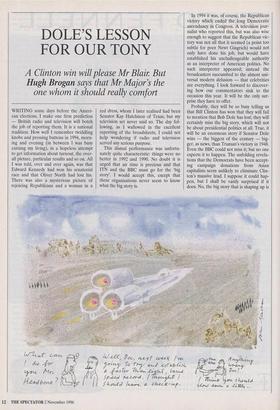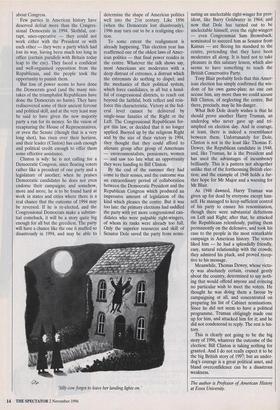DOLE'S LESSON FOR OUR TONY
A Clinton win will please Mr Blair. But
Hugh Brogan says that Mr Major's the
one whom it should really comfort
WRITING some days before the Ameri- can elections, I make one firm prediction — British radio and television will botch the job of reporting them. It is a national tradition. How well I remember twiddling knobs and pressing buttons in 1994, morn- ing and evening (in between I was busy earning my living), in a hopeless attempt to get information about turnout, the over- all picture, particular results and so on. All I was told, over and over again, was that Edward Kennedy had won his senatorial race and that Oliver North had lost his. There was also a mysterious picture of rejoicing Republicans and a woman in a red dress, whom I later realised had been Senator Kay Hutchison of Texas; but my television set never said so. The day fol- lowing, as I wallowed in the excellent reporting of the broadsheets, I could not help wondering if radio and television served any serious purpose.
This dismal performance was unfortu- nately quite characteristic: things were no better in 1992 and 1990. No doubt it is urged that air time is precious and that ITN and the BBC must go for the 'big story'. I would accept this, except that these organisations never seem to know what the big story is. In 1994 it was, of course, the Republican victory which ended the long Democratic ascendancy in Congress. A television jour- nalist who reported this, but was also wise enough to suggest that the Republican vic- tory was not all that it seemed (a point too subtle for poor Newt Gingrich) would not only have done his job, but would have established his unchallengeable authority as an interpreter of American politics. No such interpreter appeared; instead the broadcasters succumbed to the almost uni- versal modern delusion- — that celebrities are everything. I look forward to discover- ing how our commentators sink to the occasion this year. It will be the only sur- prise they have to offer.
Probably, they will be so busy telling us that Bill Clinton has won that they will fail to mention that Bob Dole has lost; they will certainly miss the big story, which will not be about presidential politics at all. True, it will be an enormous story if Senator Dole wins — the biggest of the century — big- ger, as news, than Truman's victory in 1948. Even the BBC could not miss it; but no one expects it to happen. The unfolding revela- tions that the Democrats have been accept- ing campaign donations from Asian capitalists seem unlikely to eliminate Clin- ton's massive lead. I suppose it could hap- pen, but I shall be vastly surprised if it does. No, the big story that is shaping up is about Congress.
Few parties in American history have deserved defeat more than the Congres- sional Democrats in 1994. Slothful, cor- rupt, unco-operative — they could not work either with the President or with each other — they were a party which had lost its way, having been much too long in office (certain parallels with Britain today leap to the eye). They faced a confident and well-organised opposition from the Republicans, and the people took the opportunity to punish them.
But loss of power seems to have done the Democrats good (and the many mis- takes of the triumphalist Republicans have done the Democrats no harm). They have rediscovered some of their ancient fervour and political skill, and at the very least may be said to have given the new majority party a run for its money. So the vision of recapturing the House of Representatives, or even the Senate (though that is a very long shot), has risen over their horizon, and their leader (Clinton) has cash enough and political credit enough to offer them some effective assistance.
Clinton is wily: he is not calling for a Democratic Congress, since floating voters rather like a president of one party and a legislature of another; when he praises Democratic candidates he does not even endorse their campaigns; and somehow, more and more, he is to be found hard at work in states and cities where there is a real chance that the outcome of 1994 may be reversed. If he is re-elected, and the Congressional Democrats make a substan- tial comeback, it will be a story quite big enough for all but the greediest. The party will have a chance like the one it muffed so disastrously in 1994, and may be able to determine the shape of American politics well into the 21st century. Like 1896 (when the Democrats lost disastrously), 1996 may turn out to be a realigning elec- tion.
To some extent the realignment is already happening. This election year has reaffirmed one of the oldest laws of Amer- ican politics — that final power resides in the centre. Whatever the talk shows say, most Americans are moderates with a deep distrust of extremes, a distrust which the extremists do nothing to dispel; and the mechanics of their political system, which force candidates, in all but a hand- ful of congressional districts, to reach out beyond the faithful, both reflect and rein- force this characteristic. Victory at the fed- eral level cannot be delivered by single-issue fanatics of the Right or the Left. The Congressional Republicans for- got this law, or decided that it no longer applied. Buoyed up by the religious Right and by the size of their victory in 1994, they thought that they could afford to alienate group after group of Americans — environmentalists, pensioners, women — and saw too late what an opportunity they were handing to Bill Clinton.
By the end of the summer they had come to their senses, and the outcome was an extraordinary period of collaboration between the Democratic President and the Republican Congress which produced an impressive amount of legislation of the kind which pleases the centre. But it was too late: the primary elections had saddled the party with yet more congressional can- didates who were palpable right-wingers, of whom its ranks were already too full. Only the superior resources and skill of Senator Dole saved the party from nomi- `Silly cow forgot to leave her landing lights on.' nating an unelectable right-winger for pres- ident, like Barry Goldwater in 1964; and now that Dole has turned out to be unelectable himself, even the right-wingers — even Congressman Sam Brownback, nominated to succeed him as Senator from Kansas — are fleeing his standard to the centre, pretending that they have been moderates all along. It is hard not to take pleasure in this salutary lesson, which also seems to have something to teach the British Conservative Party.
Tony Blair probably feels that this Amer- ican election has simply confirmed the wis- dom of his own game-plan; no one can accuse him, any more than we could accuse Bill Clinton, of neglecting the centre. But there, precisely, may lie his danger.
What Bob Dole dearly wishes is that he should prove another Harry Truman, an underdog who never gave up and tri- umphed on election day. And in courage, at least, there is indeed a resemblance between them. Unfortunately for Dole, Clinton is not in the least like Thomas E. Dewey, the Republican candidate in 1948, and, like Truman, he is the President and has used the advantages of incumbency brilliantly. This is a pattern not altogether unlike that of the forthcoming British elec- tion; and the example of 1948 holds a fur- ther hope for Mr Major and a warning for Mr Blair.
As 1948 dawned, Harry Truman was given up for dead by everyone except him- self. He managed to keep sufficient control of his party to ensure his renomination, though there were substantial defections on Left and Right; after that, he attacked the Republicans relentlessly, putting them permanently on the defensive, and took his case to the people in the most remarkable campaign in American history. The voters liked him — he had a splendidly friendly, easy, natural relationship with the crowds; they admired his pluck, and proved recep- tive to his message.
Meanwhile, Thomas Dewey, whose victo- ry was absolutely certain, cruised gently about the country, determined to say noth- ing that would offend anyone and evincing no particular wish to meet the voters. He thought he was doing them a favour by campaigning at all, and concentrated on preparing his list of Cabinet nominations. Since he did not seem to have a political programme, Truman obligingly made one up for him, and attacked him for it; and he did not condescend to reply. The rest is his- tory.
This is clearly not going to be the big story of 1996, whatever the outcome of the election; Bill Clinton is taking nothing for granted. And I do not really expect it to be the big British story of 1997; but an under- dog's courage is a great political asset, and bland overconfidence can be a disastrous weakness.
The author is Professor of American History at Essex University.



















































































 Previous page
Previous page